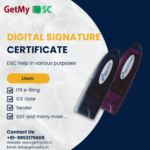In the digital age, the importance of secure online transactions and communications has never been greater. A Digital Signature Certificate (DSC) plays a crucial role in ensuring the authenticity and integrity of digital documents. This guide will walk you through the process of obtaining a DSC, its uses, and its legal implications.
Understanding Digital Signature Certificates
Table of Contents

A Digital Signature Certificate is a secure digital key issued by certifying authorities (CAs) to validate and certify the identity of the person holding this certificate. Digital signatures make use of public key infrastructure (PKI) ensuring the highest level of security during digital transactions. They allow individuals and organizations to authenticate and sign documents electronically, rather than using paper and ink.
Technical Foundations of DSCs
At the heart of a DSC is a pair of cryptographic keys: a public key and a private key. These keys are used in the encryption and decryption of data. The private key, which is kept confidential, is used to create the digital signature. The public key is disseminated widely and allows the recipients to verify the authenticity of the signature.
Authentication and Integrity
DSCs provide a level of assurance about the signer’s identity and ensure that the signed content has not been altered in transit. This is achieved through a process called hashing, where the original document is converted into a fixed-length string of characters. Any alteration to the document would result in a different hash value, thereby signaling tampering.
Non-repudiation
A key feature of digital signatures is non-repudiation. It prevents the signer from denying the authenticity of their signature on a document, as the digital signature is unique to both the signer and the document. Once a document is signed, the signer cannot claim that the signature was forged.
Legal Validity of DSCs
In many jurisdictions, including India, digi
Digital signatures have the same legal significance as traditional handwritten signatures. The Information Technology Act, 2000, provides the legal framework for the use of digital signatures in India. It states that a digital signature is valid if it is created using a “secure electronic signature” which has been “affixed in such manner as prescribed by the Central Government”3.
Why Do You Need a DSC?
DSCs are required for individuals and entities that need to sign documents electronically. This is especially relevant for filings with the Ministry of Corporate Affairs (MCA), e-tendering processes, foreign trade, income tax e-filing, and many other online transactions.
Types of Digital Signature Certificates
There are three types of DSCs:
-
Class 3 DSC – Individual (Signing Only) –Used for ESI-PF, PDF Signer, DIN KYC, MCA, GST, Trademark, and many more.
-
Class 3 DSC – Individual (Encryption) – Used for Limited e-tendering Websites, e-Procurement Websites, Trademark / Patent eFiling and IRCTC eTicketing.
-
Class 3 DSC – Individual Combo (Signature With Encryption) – Used for Limited e-Tendering, e-Procurement, e-Bidding, and e-Auction websites.
-
Class3 DSC – Organization Combo (Signature With Encryption) – Used for All India e-Tendering and e-Procurement Websites, Custom and Excise Websites, High Court Filing.
-
DSC for Foreign National Individual (Signature) – Used for foreign individuals/companies to perform transactions and share other sensitive files in a safe manner
The Process of Obtaining a DSC
STEP 1 – Choose your DSC Type: Choose your DSC among the various types of DSCs available, every DSC has a different purpose and uses.
STEP 2 – Submit Proof of Identity and Address: Make Payment online and send documents for enrollment via Email (info@getmydsc.in) or WhatsApp: +91-9953179605.
Legal Implications of DSC
Digital signatures are legally binding in India, as per the Information Technology Act, 2000. They have the same legal status as handwritten signatures, provided a licensed CA issues them.
Conclusion
Obtaining a Digital Signature Certificate is a straightforward process that can significantly enhance the security and efficiency of your online transactions. By following the steps outlined in this guide, you can ensure that your digital interactions are legally compliant and secure.
Remember, the key to a smooth DSC application process is choosing a reputable DSC Provider and carefully following their specific application procedures. With your DSC in hand, you’ll be ready to navigate the digital world with confidence.
Read More:
How to Renew Digital Signature Certificate Online?
